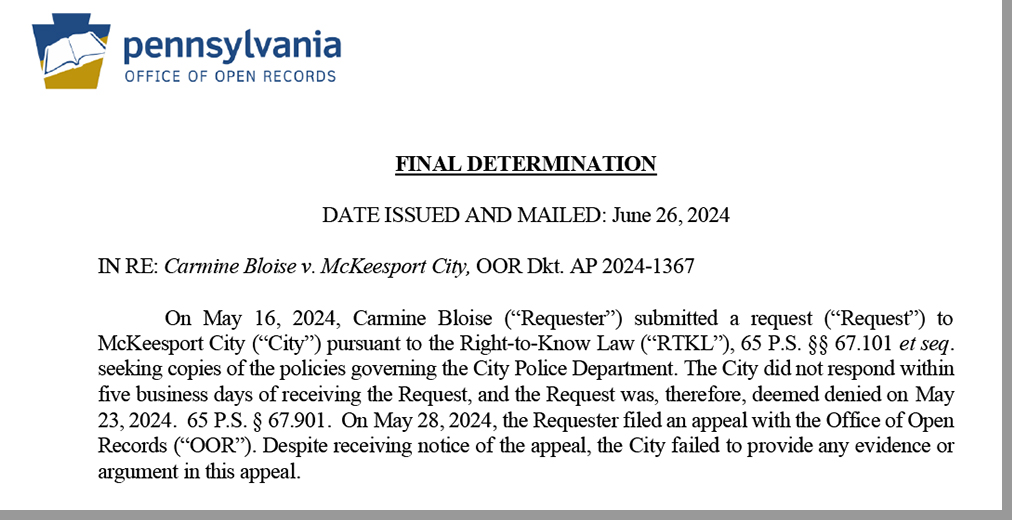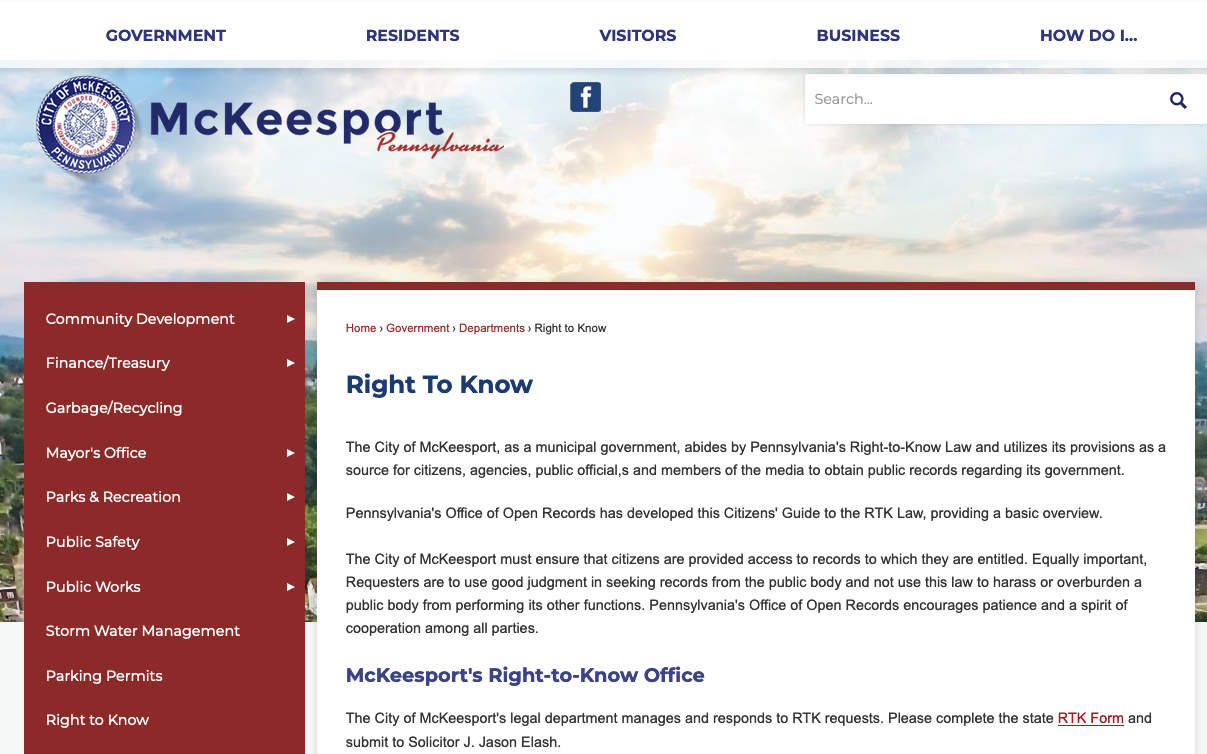(Advertisement)
Tube City Community Media Inc. is seeking freelance writers to help cover city council, news and feature stories in McKeesport, Duquesne, White Oak and the neighboring communities. High school and college students seeking work experience are encouraged to apply; we are willing to work with students who need credit toward class assignments. Please send cover letter, resume, two writing samples and the name of a reference (an employer, supervisor, teacher, etc. -- not a relative) to tubecitytiger@gmail.com.
Ads start at $1 per day, minimum seven days.
City Criticized for Right-to-Know Practices
McKeesport officials promise changes, argue state’s process itself is flawed
By Jason Togyer
The Tube City Almanac
July 02, 2024
Posted in: McKeesport and Region News

Related Story: Two Named in Case Lament Lack of Openness
The state agency overseeing access to public records last week issued a scathing report, accusing McKeesport officials of failing to respond to requests for information from members of the media, the general public and commercial businesses.
But city officials said they have responded, and that they have made changes to accommodate a right-to-know process that they argued itself is flawed and sometimes onerous.
In an strongly worded ruling, Catherine Hecker of the state Office of Open Records suggested that the city has opened itself up to civil penalities or sanctions for allegedly ignoring requests from the Pittsburgh Post-Gazette, KDKA-TV, private companies that specialize in real-estate records, and former McKeesport Area school director Joe Lopretto, who ran for mayor in 2023.
The ruling covers 10 such cases. The Open Records office cannot levy fines or penalties against a municipality. But Hecker wrote that she believes “a judicial finding of bad faith by a reviewing court would be appropriate here.”
Read the Ruling (PDF)
City Solicitor J. Jason Elash said that Hecker’s ruling was “disappointing” and that McKeesport officials have not engaged in any efforts to withhold public information.
“We were simply unaware of the requests until the related appeals were filed,” Elash said. “As previously stated, they have all been answered.”
He said the city has updated its website with “clear instructions, links to forms, and access to state definitions and resources.”
In addition, Elash said, McKeesport is creating a new email account that will be monitored daily for the sole purpose of reviewing right-to-know requests.
All of the requests listed in the decision have now been fulfilled, Elash said.

McKeesport’s website has been updated to include right-to-know act information and forms. (Screenshot)
Under the state’s Right-to-Know Law, when a citizen or organization asks for information from a government agency or municipality, the agency or municipality has five days to either provide the information; deny the request and explain why; or ask for a 30-day extension for reasons such as staffing limitations, or because the request is detailed and complex.
If the municipality does not respond, the request is deemed denied, and an appeal can be filed with the Open Records office.
. . .
In eight of the 10 requests covered by the Open Records office decision, Hecker said the city did not appeal the requests for the information, but also did not offer any explanation why the information wasn’t released.
“Local agencies have the burden of proving records are exempt from access,” Hecker wrote. “Here, the city did not comply with the (state Right-to-Know Law) by timely responding to the request(s), nor did the city participate on appeal by submitting legal argument or evidence in support of withholding records.”
Elash, however, said the Open Records office’s process for notifying communities of appeals is flawed.
The state Open Records office “doesn’t send a hard (U.S. Mail) letter” to notify the city of an appeal, he said. “They only sent an email, and they were going into spam. And we can prove that.”
In all 10 cases, he said, after being alerted of an appeal and the Open Records office’s findings, McKeesport responded, either with the information requested or by explaining why it could not comply.
“To accuse us of willful withholding of information seems illogical to me,” Elash said.
. . .
Hecker also criticized the city for failing to provide information — such as a page on its website — explaining how open-records requests were handled.
She wrote that the Open Records office alerted McKeesport in April 2023 that the city’s website did not have information required under the state’s Right-to-Know Law, or RTKL.
“The city’s repeated failure to respond to RTKL requests and consistently be involved in appeals combined with its apparent refusal to post information on its webpage can only be interpreted as direct disregard for the RTKL,” Hecker wrote. City officials promised to add a right-to-know page to the website, but did not, she said.
“In subsequent months, the city again failed to respond to requests or participate in appeals,” said Hecker, who reported that in October 2023, the Open Records office sent McKeesport another letter reminding it of its obligations.
“Since then, there is no indication that the city has responded to any RTKL requests, and it has only been involved in one appeal,” she said. “Additionally, there is no indication that the city has posted any RTKL information in its webpage.”
. . .
There is now a page on the city’s website, under the “Government” tab, that includes a right-to-know act request form.
In an email, McKeesport Mayor Mike Cherepko said the city has taken immediate steps to improve its process for responding to right-to-know requests.
“We have absolutely no issue honoring the requests, but we do not have the wherewithal to assign someone full time to (right-to-know), which is what is needed in today’s world,” he said. “Because of that, we have instituted changes that should ensure there are no more instances of requests going unseen.”
. . .
Four of the 10 cases included in Hecker’s ruling involved commercial real-estate brokers who sought information about liens against particular properties or maintenance code violations at those addresses.
Elash said such information is public record and is usually the responsibility of a so-called title search company.
Instead, he said, real estate agents are attempting to circumvent the process by asking the city to retreive the information. The city is receiving at least three requests per week from real-estate agents and attorneys handling property sales, he said.
“They want records of any ‘open and/or pending code violations or citations,’ open or expired permits, open or pending billing code violations and liens,” Elash said. “It’s easier for them to ask us than it is to pay someone to do the search — they want the taxpayers to pay someone to do the search.”
Each of those requests takes a minimum of an hour to two hours to respond, he said.
. . .
City officials — and those in other municipalities — have said they also are being vexed by websites that submit open-records requests in bulk, often anonymously.
The Right-to-Know Law allows Pennsylvania municipalities to reject anonymous requests. In June, city council approved an ordinance allowing the city to reject open-records requests that are unsigned.
“We are a small government with limited resources,” Cherepko said. “Many of these requests are time consuming – not only for our solicitor but for other employees whose primary function is to keep this city running on a daily basis. I’m all for transparency, but at some point we must discuss how in-depth and time-consuming these requests can be.”
Jason Togyer is a volunteer who serves as editor of Tube City Almanac and executive director of Tube City Community Media Inc.
Originally published July 02, 2024.
In other news:
"Friends of Norwin Lib…" || "Two Named in Case Lam…"
 TM
TM